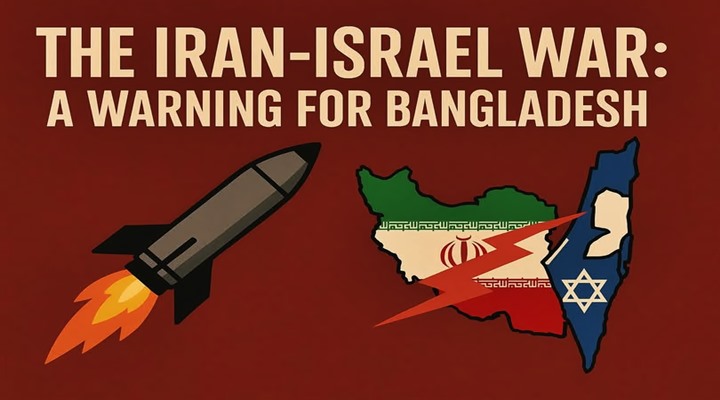■ Ahmed Daiyan ■
The bombing in Iran by the USA is a crucial lesson for all of us that the USA cannot be trusted when power is on the line. If we look at Iran and think that it is their war and not ours, we will be making a grave mistake.
Iran: The West’s controlled opponent
We must first understand how the Western rhetoric of Iran being one of their greatest rivals is not entirely true. Before the Islamic Revolution, Iran was a golden ally of both the USA and Israel. After the revolution, although Tehran had some very aggressive slogans against the West, their actions didn’t always echo their words. Even during the Iraq-Iran war in the 1980s, Iran secretly bought weapons from Israel with US approval, which later became the Iran-Contra affair.
For decades Iran served as a regional villain that was powerful enough to validate the US military presence in the Middle East but weak enough not to be an existential threat to the so-called state of Israel. However, the current war may signal that Israel no longer wants Iran as a “managed opponent” but wants it neutralised. Despite the internal divisions in the US, it appears Trump was aligned with the idea that Iran would never become a nuclear-armed state.
The Hindutva Indian ideology is very much inspired by Zionist ideas. Both believe in the supremacy of a specific group, where everyone else is categorized as subhuman. The Akhand Bharat and Greater Israel ideas are not so different from each other. The Akhand Bharat has been dismissed as an RSS fantasy for decades, but senior members of the ruling party BJP have spoken openly about this. The Indian Parliament has a map of it. If Pakistan is cornered, India may see this as a golden opportunity and assert this vision more aggressively. A more emboldened India with no ideological, economic, or even military opponent, might escalate border pressure on Bangladesh. They would try and interfere more in the internal politics of Bangladesh and militarise the region in the guise of counter-terrorism or stability.
If Iran Falls, Pakistan May Be Next
This is where it becomes critical.
Unlike Iran, Pakistan already has nuclear weapons. It also has a population with a deeply rooted Islamic sentiment and an army shaped by decades of anti-Indian doctrine. If Iran is weakened, Pakistan is the only nuclear-armed Muslim country outside Western control.
I am not saying Pakistan will be bombed tomorrow, but the strategic logic is clear:
Internal destabilisation
Pressure via economic tools like the IMF
Increased Indian support as a regional counterweight
Portrayal of security threats in Pakistan, especially in a post-Afghanistan world
Pakistan may not be a battlefield right after Iran, but it may be the next ideological target of isolation and weakening.
India: Israel’s Temu Version
The Hindutva Indian ideology is very much inspired by Zionist ideas. Both believe in the supremacy of a specific group, where everyone else is categorized as subhuman. The Akhand Bharat and Greater Israel ideas are not so different from each other.
The Akhand Bharat has been dismissed as an RSS fantasy for decades, but senior members of the ruling party BJP have spoken openly about this. The Indian Parliament has a map of it.
If Pakistan is cornered, India may see this as a golden opportunity and assert this vision more aggressively. A more emboldened India with no ideological, economic, or even military opponent, might escalate border pressure on Bangladesh. They would try and interfere more in the internal politics of Bangladesh and militarise the region in the guise of counter-terrorism or stability.
What Could this Mean for Bangladesh?
Although Bangladesh has historically avoided regional power plays, neutrality won’t be an option in a reshaped South Asia.
If Pakistan is weakened enough, Bangladesh would face massive pressure:
To align more tightly with the strategic goals of India
To maintain economic corridors and regional leverage with India
To show its commitment to democratic stability and counter-terrorism to the West
Bangladesh also hosts a massive population with Islamic and anti-Indian sentiments. Any acts for “diplomatic balance” in such a scenario might even cause social unrest, which could be a pretext for direct or indirect foreign interference.
What Next?
The Iran-Israel war is not only a step towards the reshaping of the Middle East but a step towards reshaping the Muslim world. This is a step to redraw power maps and ensure Western subservience in Muslim countries.
Countries like Bangladesh and Pakistan must understand that even if they are in the good books of the US now, there is no guarantee it will be the same tomorrow. The bombs thrown at Gaza or Tehran might very well be lobbed at us in the future.
The Muslim world is being redrawn, and we must choose where we stand before someone forces it on us.

